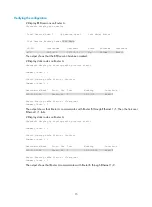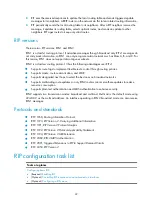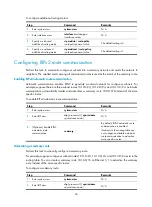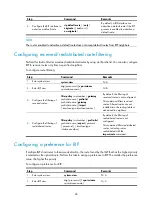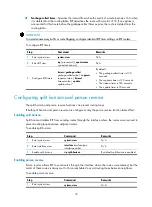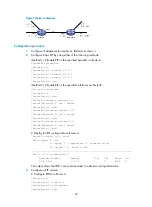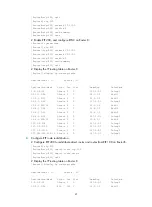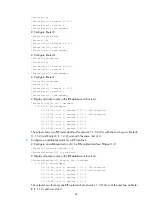
28
Step Command
Remarks
6.
Configure the RIP interface to
advertise a default route.
rip default-route
{ {
only
|
originate
} [
cost
cost
] |
no-originate
}
By default, a RIP interface can
advertise a default route if the RIP
process is enabled to advertise a
default route.
NOTE:
The router enabled to advertise a default route does not accept default routes from RIP neighbors.
Configuring received/redistributed route filtering
Perform this task to filter received and redistributed routes by using an IP prefix list. You can also configure
RIP to receive routes only from a specified neighbor.
To configure route filtering:
Step Command
Remarks
1.
Enter system view.
system-view
N/A
2.
Enter RIP view.
rip
[
process-id
] [
vpn-instance
vpn-instance-name
]
N/A
3.
Configure the filtering of
received routes.
filter-policy
{
acl-number
|
gateway
prefix-list-name
|
prefix-list
prefix-list-name
[
gateway
prefix-list-name
] }
import
[
interface-type
interface-number
]
By default, the filtering of
received routes is not configured.
This command filters received
routes. Filtered routes are not
installed into the routing table or
advertised to neighbors.
4.
Configure the filtering of
redistributed routes.
filter-policy
{
acl-number
|
prefix-list
prefix-list-name
}
export
[
protocol
[
process-id
] |
interface-type
interface-number
]
By default, the filtering of
redistributed routes is not
configured.
This command filters redistributed
routes, including routes
redistributed with the
import-route
command.
Configuring a preference for RIP
If multiple IGPs find routes to the same destination, the route found by the IGP that has the highest priority
is selected as the optimal route. Perform this task to assign a preference to RIP. The smaller the preference
value, the higher the priority.
To configure a preference for RIP:
Step Command
Remarks
1.
Enter system view.
system-view
N/A
2.
Enter RIP view.
rip
[
process-id
] [
vpn-instance
vpn-instance-name
]
N/A


